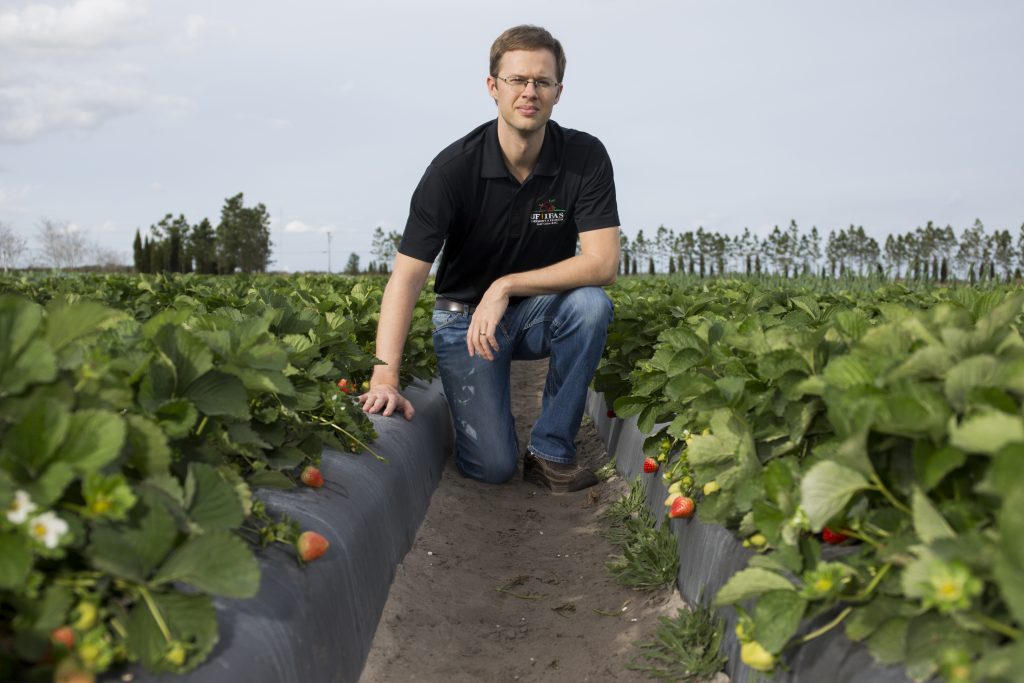
By: Brad Buck, 813-757-2224, bradbuck@ufl.edu, 352-875-2641 (cell)
BALM, Florida — UF/IFAS-bred strawberries are grown in over 70 countries across six continents. One of those countries, Egypt, ranks among the top strawberry-producing nations in the world.
So, it seems fitting that an Egyptian-American scientist is leading an effort to facilitate the expansion of production of UF/IFAS-bred strawberries internationally.
Behind the United States, which grew 1.6 billion pounds of strawberries in 2017, are Mexico, Egypt and Turkey. It’s a $300 million per year crop in Florida, primarily in the west-central part of the state.
UF/IFAS strawberries are adapted to the unique conditions of central Florida. As a result, they include low chilling, high early yield, excellent shelf life and outstanding flavor, UF’s Vance Whitaker said. Those traits make these varieties useful outside of Florida, particularly in regions of the world where strawberries are grown in the winter and early spring.
That’s where Fahiem Elsayeed Elborai comes into play. Elborai, an assistant research scientist of entomology and nematology at the Gulf Coast Research and Education Center, has been hired as director of international outreach for the UF/IFAS strawberry breeding program. He helps expand overseas markets for UF/IFAS-developed varieties.
“My main focus starts in the Middle East region, because, as an Egyptian, I know the culture and can facilitate all UF/IFAS activities in the region,” Elborai said. “I urge all who utilize UF/IFAS strawberries to comply with intellectual property rights, among other activities.”
Elborai led a Zoom webinar last week, during which researchers and growers from Africa and other continents learned the latest strawberry findings from UF/IFAS faculty. Those findings included the latest strawberry cultivars that have been released commercially – ‘Florida Brilliance’ and ‘Florida Beauty’ – as well as primers on diseases and pests that can plague the fruit.
Vance Whitaker, associate professor of horticultural sciences and a strawberry breeder at GCREC, recently hired Elborai to his new position.
“As an accomplished agricultural researcher from the region, Fahiem is unique in his ability to work with emerging markets in the Middle East,” Whitaker said. “He has made significant progress in increasing compliance with UF intellectual property rights.”
For example, Elborai tries to make sure farmers are not growing UF/IFAS varieties without permission.
“Fahiem has also done considerable work for people in developing countries,” Whitaker said. “Last year, we visited Egypt together, and it was great to see the jobs that have been created from the growth of the industry there.”
Among many duties, Elborai communicates with officials, growers, exporters and other stakeholders who use UF/IFAS strawberry varieties.
Elborai also connects researchers worldwide to introduce the UF/IFAS program to help open new markets and extend knowledge to strawberry growers in developing countries. “Lately we have supported emerging markets and even developed new markets around the world in places such as Costa Rica, Ethiopia, India and Malaysia,” he said. “Also, we are working to offer our cultivars this season to the growers in West African countries such as Gambia, Benin, Mali and Mauritania.”









